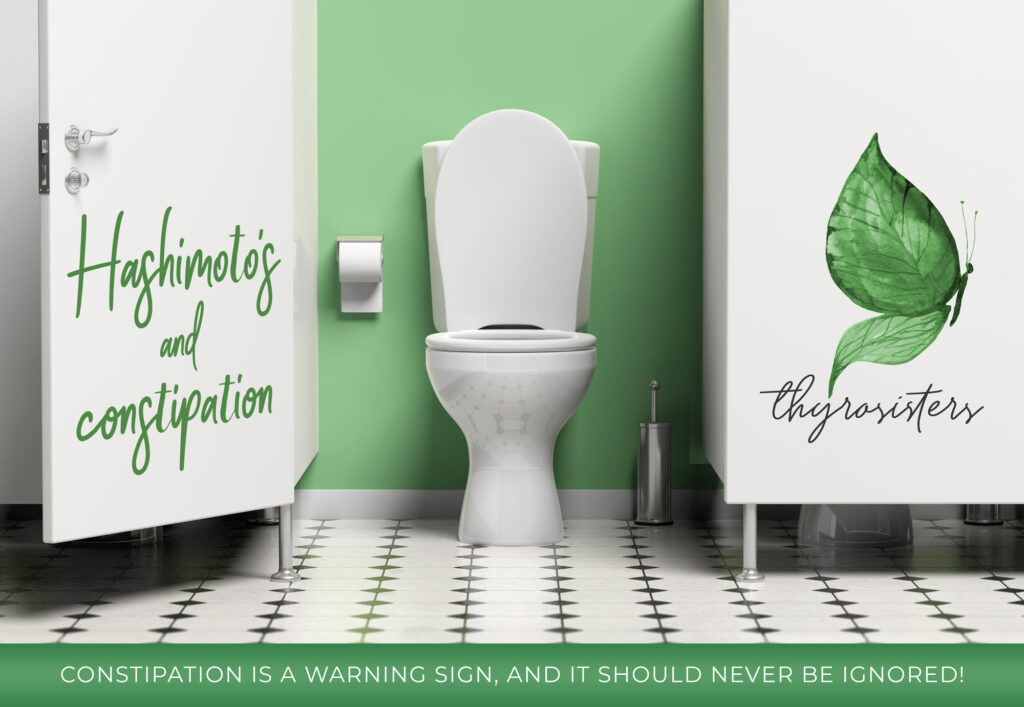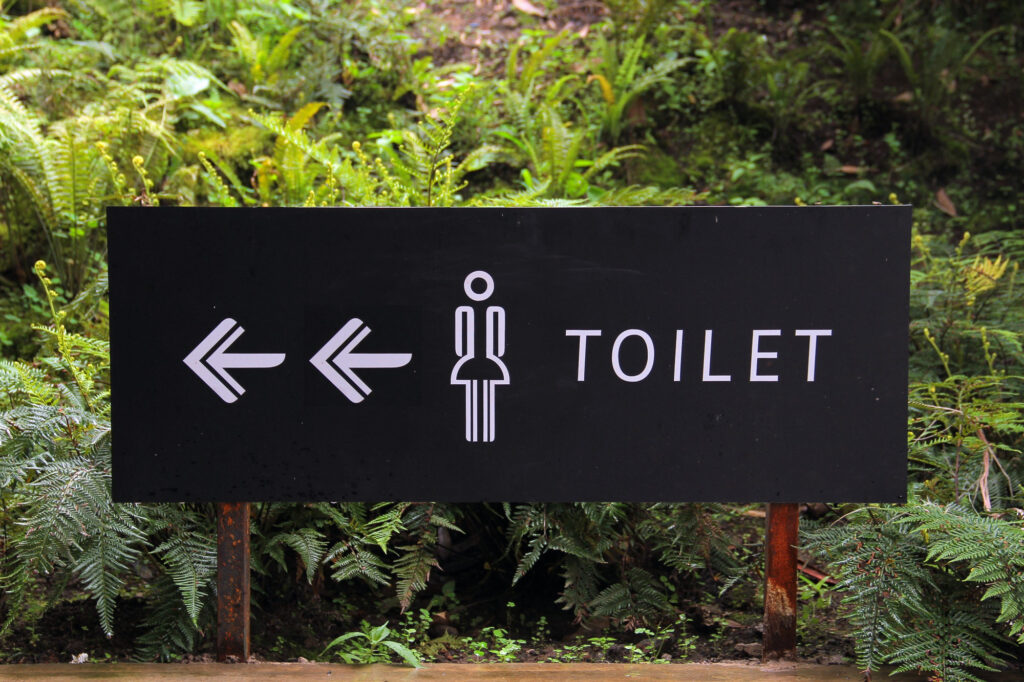Everything You Need to Know About Hashimoto’s and Constipation
Many women don’t like to talk about constipation, but it’s one of the most common symptoms of Hashimoto’s. If you suffer from chronic constipation, it’s time to shine a light on what’s happening in the bathroom so we can work together to get things moving… if you know what I mean!
Constipation is one of the most common symptoms of Hashimoto’s and is also one of the least talked about. Many women feel uncomfortable discussing their constipation, while others may not make the connection between their toilet troubles and their thyroid.
Let’s make a pact to get over politeness and talk about what Hashimoto’s really looks like. That includes discussing what some might consider embarrassing symptoms, like painful gas, hair loss, low libido, and – yes – trouble pooping. Your body is beautiful. You are beautiful. When we shine a light on Hashimoto’s symptoms, like constipation, we can learn how to manage them to feel like our best selves. So, in this article, we are going to unabashedly discuss what happens in the bathroom, why Hashimoto’s is linked to constipation, and what you can do to help things move more smoothly.
Yes, Let’s Talk Constipation
Walk down the aisle of your local pharmacy, and you’ll see the shelves lined with laxatives, fiber supplements, and probiotics. While most people don’t want to talk about constipation, it’s a common ailment. You are not alone!
According to the National Institute of Diabetes and Digestive and Kidney Diseases, constipation is defined by:
- Having fewer than three bowel movements per week
- Stools that are hard, dry, or lumpy
- Stools that are difficult to pass
Most people experience constipation at some point in their lives, which can be caused by various factors. Some of the most common causes of constipation include:
- Dehydration
- Certain medications
- Certain supplements
- Physical inactivity
- Eating a diet high in meat or processed foods
- Certain conditions, such as hypothyroidism, irritable bowel syndrome, diabetes, and Parkinson’s
For most, constipation is a short-term issue, but for many others – especially those with Hashimoto’s – constipation is a chronic reality.
Constipation is not a disease. It is a symptom of a larger problem within your body. Constipation is a warning sign, and it should never be ignored!
The Connection Between Constipation and Hashimoto’s
In a healthy digestive system, muscles in the large intestine, also known as the colon, contract to move food waste toward the rectum. At the same time, the colon absorbs water from the food waste so that it becomes more solid and can eventually be eliminated.
An underactive thyroid defines Hashimoto’s. If you’ve studied the thyroid in any fashion, then you already know that it plays a huge role in regulating functions throughout the body. The exact research on why Hashimoto’s causes constipation isn’t as thorough as it should be, but the current popular thinking is that a low thyroid hormone level tends to slow down systems within the body, including in the colon.
Researchers hypothesize that in people with Hashimoto’s, the muscles of their colons don’t contract as strongly as they should, making it difficult to move stools. This is known as reduced gut mobility. Early research shows that people with hypothyroidism may also have higher rates of a condition called small intestinal bacterial overgrowth, or SIBO. Those with SIBO suffer from too much bacteria in the small intestine, which can lower the ability of the small intestine to process and move food waste into the large intestine.
Consult a Doctor About Your Constipation
If you are suffering from chronic constipation, consult your doctor. Be honest and open about your symptoms. Before you attribute your constipation to Hashimoto’s, it’s important to eliminate other potential causes that could be affecting your digestive health. It may be that a medication or supplement you’ve been taking is causing your issues.
If you’ve eliminated other possibilities, then it’s time to test your thyroid functioning if you haven’t previously tested your thyroid. If your thyroid is not producing enough thyroid hormones, then you likely have hypothyroidism. The most common cause of hypothyroidism is Hashimoto’s.
The fact that you’re reading this article means you’ve probably already been diagnosed with Hashimoto’s or suspect that you have it. So, how can you actually address your painful and uncomfortable constipation symptoms? Fortunately, there are many things you can do to alleviate constipation.
Treat Your Hashimoto’s
The first and best thing you can do to fix your constipation is to treat your Hashimoto’s. Remember, constipation is a symptom. Treating your constipation directly is like trying to turn off your smoke alarm instead of dealing with a fire. Treating your Hashimoto’s will help you alleviate all your Hashimoto’s symptoms.
How do you treat your Hashimoto’s? Treatment plans can vary, and some women choose to receive synthetic thyroid treatments. My treatment protocol, however, is more holistic and combines dietary changes along with supplements, lifestyle changes, healthy habit formation, and consistent testing.
Change Your Diet
Certain changes to your diet can help you get things moving along if you know what I mean. Unsurprisingly, the best dietary choices for your gut health are the same recommendations I make for managing Hashimoto’s. First, steer clear of as many processed foods as possible. Your body was not designed to handle all that excess sugar and salt or those extra food chemicals. Eat natural foods that are high in fiber. Green, leafy veggies, in particular, are a great option. Salads, anyone?
Drink More Water
Dehydration will only make your constipation symptoms worse, so make sure you are getting enough water each day. As much as possible, avoid sugary drinks, including fruit juices, and focus on healthy, low-cost, delightful water. Women should try and drink 11.5 cups of water each day. (Guys need to up their water consumption to 15.5 cups.)
Don’t count coffee toward your liquid intake, as caffeine is a diuretic. Try a warm glass of water with lemon in the morning to alkaline the body and start things moving.
Get Up and Move!
Exercise will encourage your digestive tract to rev up and eliminate any waste you’re holding onto. Fatigue is a common symptom of Hashimoto’s, so if the idea of hitting the gym or heading for a run feels overwhelming, start with a daily walk. Even a small amount of exercise can help you feel better.
Try Some Supplements
If more holistic measures don’t work, then you may wish to try some supplemental help to find relief. Consider taking a fiber supplement, though work up slowly so as not to throw your digestive system out of whack. Some women have also had success with certain probiotic supplements. Take great care in choosing your probiotics, as some can actually make your constipation worse. There are probiotics for acne, pregnant women, while you are on antibiotics.
Digestive enzymes can also be of help. They break down fats, proteins, and carbohydrates, decreasing gas and bloating. The enzymes in your digestive tract actually decrease with age, so the loss of enzymes could make your constipation worse over time.
Finally, consider taking magnesium. Normally, the magnesium in soil works its way into the fruits and veggies we eat, but many of today’s foods are lacking in magnesium, meaning you may need to get it in the form of a supplement. Magnesium supports over 300 biochemical pathways and can be a great help with constipation and better sleep. There are several types of magnesium, but I prefer magnesium glycinate as it is easy on the digestive tract compared to magnesium citrate. A few hundred milligrams of magnesium glycinate in the evening before bed may provide deeper sleep and a robust bowel movement in the morning.
Review Your Medications
As I mentioned earlier in this article, some medications can either cause constipation or make it worse. Review all of your medications with your doctor to determine if they may be interfering with your digestive processes. If so, your doctor may be able to suggest a different dosage or alternative medicine.
Talk to a Gastroenterologist
Finally, if you’ve tried everything, your thyroid numbers are good, and you still have chronic constipation, it may be time to seek the guidance of a gastroenterologist. If your symptoms are manageable, I suggest trying to work on your Hashimoto’s first to see if you feel relief. However, if you are in a lot of pain or see blood in your stool, then schedule an appointment with a gastroenterologist.
What Your Constipation Is Telling You
Your constipation is trying to tell you something. It’s trying to tell you that your body is not operating as it should. For many women, constipation is a telltale sign of Hashimoto’s and hypothyroidism. If this is the case, then the best way to alleviate your constipation is to address your Hashimoto’s. If you want to be tested for Hashimoto’s or would like a customized Hashimoto’s treatment plan, contact me to schedule a clarity call.








